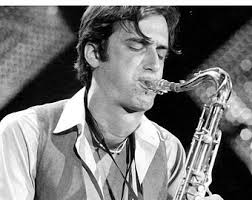We are in for a treat today! I contacted Rick Margitza (a great tenor saxophone player) on facebook the other day and asked if I could share his two transcriptions of Michael Brecker’s solos from two Steps Ahead bootlegs of Four Chords. I came up with the idea of placing these two transcriptions along side my transcription from the original Paradox CD to compare Brecker’s lines and ideas over the chords.

Steps Ahead in the 80’s
I’ve found that by placing the 3 solos next to each other on staves you can find certain similarities and concepts in common through each chord. This is a great way to decipher and pinpoint an approach or concept that Brecker might have used when soloing over certain chord changes. The similarities make these concepts all the more recognizable.
Let’s take a look at these concepts one measure at a time (We will be referring to the Bb key for the chords). I will start on the first measure (not counting the pickup measure):
Measure 1-F#-11 (the original Don Grolnick score has this chord as a F#-7sus)
For the most part, Brecker is highlighting the F# minor pentatonic during these F#-11 chords. The main notes are F#ABC#E F#. When playing over a minor chord the question arises on what to play for the 2nd and 6th degree of the scale. If you go with dorian the 2nd would be G# and the 6th would be D#. Brecker does not do this. During the times that he includes those scale degrees he goes for a G for the 2nd and a D for the 6th. This is the Phrygian mode. F#GABC#DEF#. When trying to figure out what scale to use over a minor chord I teach students that they have to do a little detective work with the chord before and after the specific minor chord (as well as using their ears). In this case the chord before F#-11 is a G13(has a G and D). The chord after the F#-11 is a C#7#5#9 (also G and D if you use the C# altered scale). So in this case the phrygian mode makes sense for this minor chord.
Measure 2-C#7#5#9 (the original Don Grolnick score has this chord as a F#-7sus although there is a F in the bass on the sheet music and I know I hear an F in the comping on this measure so I’m going with C#7#5#9……..)
The typical approach to this chord is the C# altered scale which is C#DEFGABC#. Brecker’s lines over this measure generally take on the form of outlining a C# altered scale, F Lydian type of idea or a G7 bebop scale type of line. F lydian is FGABCDEF and the G dominant bebop is GABCDEFF#G. You can see how the F Lydian and G7 bebop lines share most of the same notes as the C# altered scale. The lines sound great over this chord and using these 3 concepts over altered chords will give us a load of new ideas and lines!
Measure 3-DMaj7
Brecker treats this measure with some pretty common D Major patterns on every chorus. He even throws in a common Coltrane line a bunch of times (top of page 8 solo 2 DMaj7 , bottom of page 10 solo 3 DMaj7, top of page 12 solo 2 DMaj7, middle of page 13 solo 2 DMaj7, bottom of page 18 solo 3 DMaj7. It’s obvious that Brecker likes this lick and probably got it from Coltrane as did the rest of us that studied Coltrane at one time…………
Measure 4-C#-11 F#7#9
Here we have a ii-V going to B minor. For the most part Brecker seems to be treating this whole measure as F#7 altered or G melodic minor. These are the same scale GABbCDEF#G. The difference in my opinion is usually when a player is thinking G melodic minor the G minor sound is outlined. When the same notes aren’t outlining G minor then the player is probably thinking more of the F# altered scale.
Measure 5-B-7
Brecker is mainly outlining the B minor sound. I notice a greater use of approaches to B minor in these measures.
Measure 6-A-7b5 D7(b5)
For the most part, Brecker seems to be going with A locrian on this measure. ABbCDEbFGA. Once in a while he throws in a B instead os the Bb or an F# instead of F. He also uses the D7 altered scale at times as well as just some cool chromatic lines. The chord on the sheet music is D7b5 but I don’t see Brecker trying very hard to hit an Ab on the D7b5 chord…………
Michael Brecker in the 70’s
Measure 7-G#-7b5 Gm6 Bbm6
The common theme with this measure seems to be B’s and G#’s during beats 1 & 2. In general Brecker does a great job of staying within the chords on beats 3 & 4. They happen fast at one beat each and I’m surprised he stays withing the chord changes as many times as he did during the solo for those beats. That is mastery!! Sometimes he chooses to also go chromatic on beats 3 & 4 also…………….
Measure 8-C#7#9
You guessed it……more of the altered scale madness. C#DEFGABC#. (Which again is also D melodic minor). He also goes the chromatic route a number of times during this measure.
Measure 9-F#-7
Same as measure 1 above…….Lot’s of F# minor pentatonic lines going on…………….
Measure 10-E-7 A7
These lines are pretty straight forward outlining the E-7 and then Brecker usually morphs into an A altered line during A7. Page 15 solo 2 is interesting as Brecker is outlining E-7 F7 Bb Db7……and then continues into D Major on the next page with F# which of course we recognize from Coltrane also (Countdown)…………
Measure 11-DMaj7
Same as measure 3 above…………..
Measure 12-C#-11 C13
This is an interesting measure as it is a ii-V with a tritone substitution for the V7. The V would be F#7. I didn’t specifically hear the C13 expect for a few times and thought that chord was a F#7 altered. I’m guessing that the band goes back and forth on that chord. Brecker certainly seems to be favoring the F# altered scale (G melodic minor) on this measure. Many times he starts the measure with EGBbD over the C#-11 chord. (I love the line on page 10 solo 1 on this chord!! He’s using wider intervals on the altered scale to give it an almost pentatonic sound…….)
Measure 13-B-11(the original Don Grolnick score has this chord as a B-7sus)
Same as measure 5 above…………..
Measure 14-FMaj7 EbMaj7
Brecker does a great job of outlining these chords in this measure. So much so that I knew the chords just from the lines he was playing. There is a line on page 11 solo 3 where he seems to be thinking triad pairs of F and Eb over the whole measure and creating a random line with that concept.
Measure 15-AMaj7b5
For the most part, Brecker is just playing with A major ideas during this measure. I don’t see him trying very hard to incorporate the b5 into his lines although once in a while he does.
Measure 16-G13
Brecker’s going totally bebop scale crazy on this measure usually. It is so dominant that before I even knew the chords I thought that was a G7 chord there just from Brecker’s lines. There are some classic hardbop lines to check out here. Page 8 solo 1 is one of my favorites on that measure.
Michael Brecker-Steps Ahead Poster
Again, special thanks to Rick Margitza for allowing me to post his incredible transcriptions. I feel like I learned a lot by placing them side by side with my own and analyzing the lines. I’m looking forward to continuing to work on these solos and implementing the lines and concepts into my own playing more and more. Brecker was the man!!!! We all miss you!
**If you run across any ideas or concepts that I overlooked in my analysis please feel free to comment on them below. Have fun practicing!!!!
Four Chords-3 Brecker Solos Combined
Four Chords Brecker Live 2-NYC 9-81 original transcription by Rick Margitza
Four Chords Brecker Live 2-NYC 9-81 Bootleg mp3 (right click and click on “save link as” in your browser to save this mp3 to your computer)
Four Chords Brecker Live 3-NYC 9-81 original transcription by Rick Margitza
Four Chords Brecker Live 3-NYC 9-81 Bootleg mp3 (right click and click on “save link as” in your browser to save this mp3 to your computer)
If you like these type of outside modern sounding lines like I do, be sure to check out my Devastating Lines for Jazz and Funk Soloing for Minor and Dominant Grooves. These two books are filled with great modern 16th note lines in all 12 keys that you can learn and use while soloing. Check out all the 5 star reviews! Steve







Steve – What is your latest book? If I remember correctly, it was for sale 2 or 3 weeks ago.
I will buy it instantly if you could send me a link.
Kind regards,
Michael
Michael, My latest book is Mastering Altered Pentatonics.
http://www.neffmusic.com/blog/product/mastering-altered-pentatonics-digital-pdf-book/
Thanks, Steve